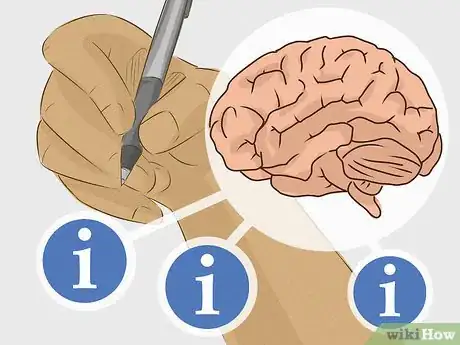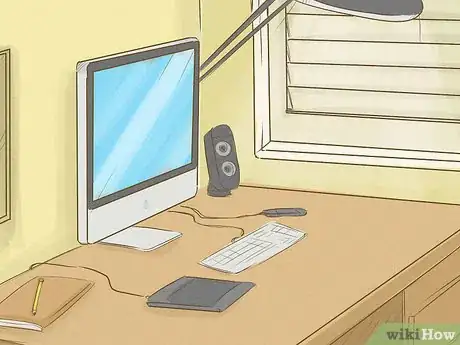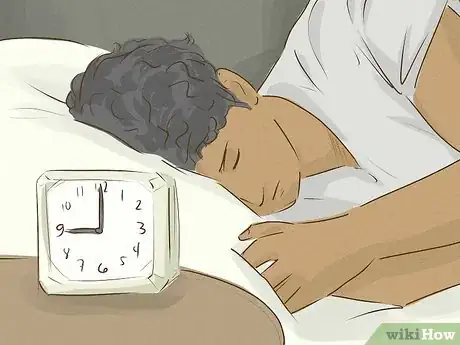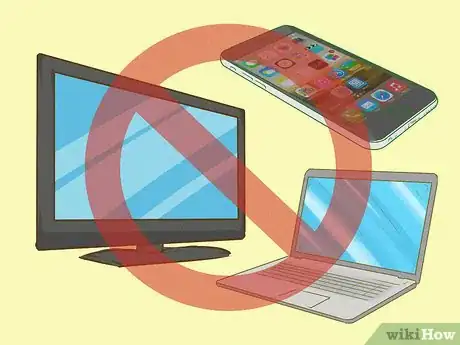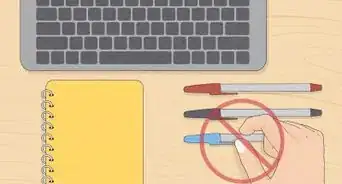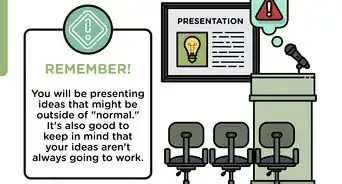This article was co-authored by Sandra Possing. Sandra Possing is a life coach, speaker, and entrepreneur based in the San Francisco Bay Area. Sandra specializes in one-on-one coaching with a focus on mindset and leadership transformation. Sandra received her coaching training from The Coaches Training Institute and has seven years of life coaching experience. She holds a BA in Anthropology from the University of California, Los Angeles.
This article has been viewed 74,145 times.
In today’s fast paced and often cluttered world, your mind might be struggling to make sense of it all. You may feel as though your thoughts are jumbled and that you go through your day jumping from one thing to the next with no logical transition. Though many people fall into this routine, you can get yourself out of it and bring your thoughts to order. Techniques like writing out your thoughts, trimming down the amount of information your mind has to handle, and being rested enough to process it all can help tremendously to thinking in a logically organized way.
Steps
Tracking Your Thoughts
-
1Make a chart. This can take the form of a pie graph that depicts the percent of time or energy that you spend on different thoughts. You could also create a timeline of your thoughts. Graphing your thoughts gives you a visual representation of what is currently going on in your mind, and helps you create goals to think in a more organized way.[1]
- For example, you could break thoughts into categories like worrying, sad, happy, stressed, and content. Each time you have a thought, decide which category it goes in and mark it down. At the end of the day, you can put the numbers into a pie chart and see what percentage of your day each type of thought took up.
-
2Record all of your thoughts. Instead of just graphing thoughts, you can keep track of your thoughts in real time by recording them. Use a voice recorder and speak your thoughts out loud. Just be sure that you are alone while you discuss your thoughts on recording.[2]
- For example, if you are driving in the car and thinking, you could have voice recorder on that allows you to talk out loud. Then you have a record of all of the thoughts that you had in the car (Just be sure not to get distracted too much, being distracted while behind a vehicle is extremely dangerous).
Advertisement -
3Write out your thoughts.[3] Finally, writing down your thoughts is a tried and true way to keep track of them. Keep a journal or notebook that is used only for your thoughts. Review it every day, week, or month to monitor how organized and logical your thoughts are becoming.[4]
- You can choose to journal every thought, or only journal about certain thoughts. For example, you might create a journal to track all of the thoughts you have about your vacation plans.
-
4Prioritize your thoughts.[5] Regardless of how solid your focus might be, distraction is always waiting right around the corner. When your mind is presented with a new stimulus, it creates a new thought. You have to decide whether that thought is worth entertaining right now, or if you should keep doing what you were doing before. These priorities are what make your thoughts follow logical progressions.[6]
- An example of prioritization might be ignoring the television while you are trying to work. Even though the thought of the TV is present, it doesn’t take precedent over your work.
Clearing Your MInd
-
1Meditate.[7] Meditating can reduce stress and anxiety. You typically have up to 80,000 thoughts flow through your mind daily.[8] Depending on your stress level, or your personal behavioral and characteristic make-up, you could have much more than that. When you meditate, you can learn how to master your own internal dialogue by eliminating what is not important, and putting more energy and focus into organizing what is needed and important. That frees your mind up to focus on the thoughts that are really important. Meditation also gives your mind a break from the constant stimuli that fills our society. You only need to meditate for 15-20 minutes per day to see benefits.
- You can choose to meditate at any time of day, but most people tend to do a meditation first thing in the morning or right before bed. Try different times and see what works for you.
-
2Release negativity. Develop a habit of incorporating positive affirmations into your daily life. Affirmations are positive words or statements that when incorporated into a daily meditative practice can help you to reprogram your internal dialogue. When you reframe your thoughts in this way, your mind becomes a more constructive mental environment and this allows you to focus on what is important to you rather than what is not important.[9]
-
3Go exercise. Exercising releases endorphins, which elevate your mood. It also reduces the levels of the stress hormone cortisol. This dual effect means that exercise primes your brain for positivity and focus. These are the prerequisites to having logically organized thoughts.[10]
- Even if you don’t enjoy the gym, you could still benefit greatly from a regular walk or run. As long as you get out and exercise, you’ll start to feel your mind handling things more effectively.
-
4Talk to someone. Having someone to bounce your ideas off of is crucial. Even just speaking to another person can help you to see any fallacies in your logic and improve your thought process. The other person can also offer you feedback and help you to see any unorganized or unclear thought patterns.[11]
- For example, say you have a big presentation coming up at work. Instead of going in with a jumble of notes and slides, show the presentation to a co-worker first and get some feedback. This will help you order the presentation logically.
-
5Break information into chunks. Large blocks of information can be broken down into smaller chunks that are easier to remember. This process is called chunking and helps to speed up your mental processes because it organizes your stored memories into logical patterns. You can use the same process to break complex ideas down into more logical pieces.[12]
- An example of chunking information would be memorizing a bank routing number. The long number is broken into smaller, easier to remember groups of numbers.
-
6Declutter your home and/or office. Being in a cluttered environment can make your brain feel claustrophobic. Set yourself up for logical, organized thinking by cleaning up and clearing out the space around you. You can even turn it into fun event by having a friend or family member help you decide what to keep and where to put things.[13]
- You could spend a day having a cleaning party. Invite some friends over and order pizza and drinks. You could even watch a movie after the work is all done.
Getting Enough Rest
-
1Go to bed at a reasonable time. Your body, and mind, follows patterns known as circadian rhythms. If you keep a consistent, healthy schedule, it will help your brain function optimally. This is important for keeping your thoughts organized and logical throughout your waking hours.[14]
- Meditate before bed to help promote restful sleep.
- Exercising throughout the day will help make you ready for bed earlier in the evening.[15]
-
2Aim for seven to eight hours of sleep. Aside from going to bed early, you also need to sleep late enough. The optimum amount of sleep (for most people) is between seven and eight hours. Not only does this give your brain the energy needed to think logically, sleep also helps your brain to consolidate thoughts into logical, organized memories.
- Avoid things like large meals, alcohol, and caffeine late in the evenings. These can keep your body stimulated and awake at bedtime.[16]
-
3Keep your room quiet. Avoid having a television or radio playing in your room. If noise from outside is an issue, try to use heavy blinds to dampen the sound. A quiet, dark room promotes a restful night of sleep.[17]
- A fan or other sound constant sound can help to block noises from outside the room.
- A fan will also keep the room cooler, which can aid in getting restful sleep.
-
4Limit the activities you do in bed. The more things your brain associates with the bed, the harder it will be to calm down and go to sleep. Keep things like televisions, computers, cell phones, and other distractions out of the bedroom. You will wind down faster and sleep better.[18]
-
5Take breaks through the day. To avoid exhaustion and brain fog, you need to let your mind rest through the day. Recommendations vary from 15 minutes per day of down time to 15 minutes per hour. Take the amount of time that you need to keep your thoughts organized, and you will see a boost in your work and personal life.[19]
Expert Q&A
-
QuestionHow do I stop having negative thoughts?
 Sandra PossingSandra Possing is a life coach, speaker, and entrepreneur based in the San Francisco Bay Area. Sandra specializes in one-on-one coaching with a focus on mindset and leadership transformation. Sandra received her coaching training from The Coaches Training Institute and has seven years of life coaching experience. She holds a BA in Anthropology from the University of California, Los Angeles.
Sandra PossingSandra Possing is a life coach, speaker, and entrepreneur based in the San Francisco Bay Area. Sandra specializes in one-on-one coaching with a focus on mindset and leadership transformation. Sandra received her coaching training from The Coaches Training Institute and has seven years of life coaching experience. She holds a BA in Anthropology from the University of California, Los Angeles.
Life Coach The most effective way to stop negative thoughts is to acknowledge them when they happen so you can redirect them. I suggest keeping a thought log where you write down what you're thinking each day. If you come across a thought that isn't helpful, try to reframe it into something more positive. For example, if you were thinking about how you're doing a bad job at work, you could remind yourself that your job is difficult, but you're improving each day.
The most effective way to stop negative thoughts is to acknowledge them when they happen so you can redirect them. I suggest keeping a thought log where you write down what you're thinking each day. If you come across a thought that isn't helpful, try to reframe it into something more positive. For example, if you were thinking about how you're doing a bad job at work, you could remind yourself that your job is difficult, but you're improving each day.
References
- ↑ http://www.theorderexpert.com/17-ways-to-organize-your-thoughts/
- ↑ http://www.theorderexpert.com/17-ways-to-organize-your-thoughts/
- ↑ Sandra Possing. Life Coach. Expert Interview. 13 August 2020.
- ↑ http://www.theorderexpert.com/17-ways-to-organize-your-thoughts/
- ↑ Sandra Possing. Life Coach. Expert Interview. 13 August 2020.
- ↑ http://www.additudemag.com/adhd/article/9363-3.html
- ↑ Sandra Possing. Life Coach. Expert Interview. 13 August 2020.
- ↑ Sandra Possing. Life Coach. Expert Interview. 13 August 2020.
- ↑ Sandra Possing. Life Coach. Expert Interview. 13 August 2020.
- ↑ http://www.theorderexpert.com/17-ways-to-organize-your-thoughts/
- ↑ http://www.theorderexpert.com/17-ways-to-organize-your-thoughts/
- ↑ https://www.psychologytoday.com/blog/the-power-forgetting/201402/four-secrets-organizing-info-quickly-in-your-brain
- ↑ http://www.additudemag.com/adhd/article/9363-4.html
- ↑ http://www.theorderexpert.com/17-ways-to-organize-your-thoughts/
- ↑ https://www.helpguide.org/articles/sleep/how-to-sleep-better.htm
- ↑ https://www.helpguide.org/articles/sleep/how-to-sleep-better.htm
- ↑ https://www.helpguide.org/articles/sleep/how-to-sleep-better.htm
- ↑ https://www.helpguide.org/articles/sleep/how-to-sleep-better.htm
- ↑ http://www.theorderexpert.com/17-ways-to-organize-your-thoughts/









